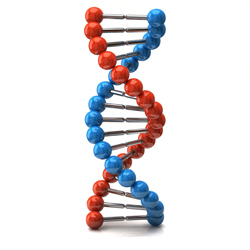Can police use 'inadvertently shed' DNA without a warrant? SCOTUS won't hear case raising the issue

Image from Shutterstock.
The U.S. Supreme Court on Monday denied cert in a case challenging the warrantless use of DNA left on the arms of a chair at the police station.
The Supreme Court let stand the ruling by Maryland’s top court upholding the rape conviction of Glenn Joseph Raynor, who refused to provide a DNA sample but agreed to go to the police station. The Electronic Frontier Foundation had urged the Supreme Court to accept the case, Ars Technica reports.
Raynor did not become a suspect until two years after the 2006 rape when the victim told investigators she suspected him because of a call she made in 2008 to a tree trimming business. The call was not returned, and the victim decided it may be because Raynor was partners with the tree trimmer. She remembered that Raynor’s body type matched that of the attacker and called police. The cert petition is here (PDF).
The EFF brief had argued that allowing police the limitless ability to collect genetic material “will usher in a future where DNA may be collected from any person at any time, entered into and checked against DNA databases, and used to conduct pervasive surveillance.”



